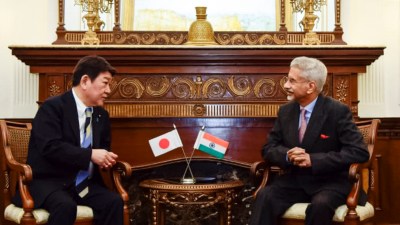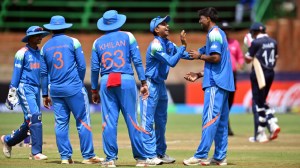A question of intelligence
Immediately after 9/11, it was apparent that the intelligence and security agencies of the US had been caught napping by the Al Qaeda. But i...

Immediately after 9/11, it was apparent that the intelligence and security agencies of the US had been caught napping by the Al Qaeda. But in the initial wave of patriotism, criticism of the agencies was muted.
Now that the war against terrorism has entered the second year, the need for a professional critical analysis is receiving greater attention, resulting in a congressional investigation.
This investigation, still ongoing, has brought to light serious deficiencies in the functioning of the Central Intelligence Agency CIA and the Federal Bureau of Investigation FBI.
One, lack of serious attention by the senior leadership to concerns expressed by their junior officers. Two, lack of adequate communication among agencies resulting in a failure to promptly share intelligence about the movements of suspected or confirmed Al Qaeda operatives. Three, lack of adequate linguists in the technical intelligence agencies resulting in delay in the translation of vital communications intercepts. Four, lack of adequate analysis of available intelligence contributing to complacency and lethargy.
As one reads the details of the investigation coming out of the Congress, one is reminded of the famous congressional inquiry into the case relating to the betrayal of the CIA by Aldrich Ames, one of its senior officers, who worked for years for the Soviet and Russian agencies and sent valuable US sources to death without being detected in time by the counter-intelligence set-ups of the CIA and the FBI.
That intelligence disaster took place not for want of intelligence but for want of communication, trust and co-ordination between the CIA and the FBI. The present investigation into 9/11 shows no lessons were drawn from the systemic failure of the US intelligence community in the Ames case.
The US has more laws regulating the functioning of its intelligence agencies, more congressional and other watchdog bodies to monitor their performance, more governmental and private experts in intelligence-craft, it has had more blue-ribbon commissions to go into the working of its agencies and spends more money on intelligence collection and assessment than any other country in the world. Yet it has an intelligence community which does not do credit to the sole super power of the world.
The CIA is one of the most politicised agencies in the democratic world. Very often, it tells the president what he wants to hear and not what he ought to hear. If Bush calls North Korea, Iran and Iraq the axis of evil and Saddam Hussain as great a threat as Osama bin Laden, the CIA must be working overtime to prove how perspicacious he is.
During and after the Gulf War, Saudi Arabia was looked upon as a stalwart ally as Pakistan is today. Indicators of Saudi nexus with Al Qaeda were ignored. Similar indicators of a Pakistani nexus are not receiving the attention they deserve today.
There has also been a fascination with covert operations. During the Afghan war of the 1980s against the Soviet troops, more attention was given and more money allotted for strengthening the covert action capability and the disinformation apparatus of the CIA than for improving its intelligence collection and analysis capability.
The result: the CIA went around creating an army of pan-Islamic terrorists for using them against the USSR without realising that one day they could become a menace to the democratic world. And when they started doing so in the 1990s, there was a reluctance to act against them firmly till 9/11 happened.
The US has a plethora of intelligence agencies, but no independent over-all co-ordinator. The director, CIA, wears two hats. As the head of the CIA, he is responsible for its functioning. As director, central intelligence, he acts as the adviser to the president on intelligence matters and helps him in the co-ordination of various agencies.
He often chairs the various committees of the national security council secretariat set up to review intelligence policy matters. The tremendous influence thus wielded by the head of one of the agencies over the entire community has been criticised on the ground that it does not encourage fairness in co-ordination.
Before 9/11, the US intelligence community always considered major threats to the US from terrorist strikes as more likely to be targeted at US nationals and interests abroad than inside the US. As a result, the CIA, as the external intelligence agency, was given the leadership role in the multi-agency counter-terrorism centre and not the FBI.
The US was the only country in the democratic world which did not have a separate department dealing with internal security similar to the home ministry or department in India. Nor did it have an internal intelligence agency exclusively devoted to the collection of internal intelligence similar to the Security Service MI5 of the UK.
The FBI is a hotchpotch agency, which handles counter-terrorism, counter-intelligence, investigation of organised and federal crime, law enforcement etc.
It took the catastrophic consequences of 9/11 to convince the US policy-makers of the need for a Homeland Security Department. Having realised the need, the Bush Administration has been going about the task of setting it up in an unwise manner.
If and when Bush8217;s ideas are implemented, what the US will have is not a lean, hungry and well motivated agency, but a security leviathan, more cumbersome and much slower than an elephant.
The US, which often criticises the bureaucracies of the developing world, has the shoddiest bureaucracy in the democratic world.
And nothing is shoddier in its bureaucracy than its intelligence community, which is the most pampered part of the administration. US investigators are often thorough in their analysis of the failures of the intelligence community, but lacking in wisdom and imagination in prescribing correctives.
The CIA has bloated after each failure. What the US intelligence community needs is less staff, less funds and less gadgets, but greater professionalism, better motivation, more perspicacity, better analysis and linguistic skills, sharper intuition and greater humility in accepting that there are others in the world who understand terrorism better and that it should learn from them.
- 01
- 02
- 03
- 04
- 05































